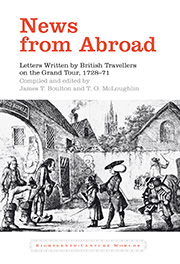Book contents
- Frontmatter
- Contents
- Preface
- Illustrations
- Acknowledgements
- ‘Old Style’ and ‘New Style’ Dating
- Map
- Introduction: The Grand Tour
- The Tourists and Their Letters
- George Lyttelton (1709–73): Letters (1728–30)
- Joseph Spence (1699–1768): Letters (1730–3)
- James Boswell (1740–95): Letters (1764–6)
- James Barry (1741–1806): Letters (1765–71)
- Caroline Lennox (1723–74): Letters (1766–7)
- Appendix A The Hazards of Collecting Art on the Grand Tour
- Appendix B Advice to Travellers on the Grand Tour
- Bibliography
- Index
Joseph Spence (1699–1768): Letters (1730–3)
- Frontmatter
- Contents
- Preface
- Illustrations
- Acknowledgements
- ‘Old Style’ and ‘New Style’ Dating
- Map
- Introduction: The Grand Tour
- The Tourists and Their Letters
- George Lyttelton (1709–73): Letters (1728–30)
- Joseph Spence (1699–1768): Letters (1730–3)
- James Boswell (1740–95): Letters (1764–6)
- James Barry (1741–1806): Letters (1765–71)
- Caroline Lennox (1723–74): Letters (1766–7)
- Appendix A The Hazards of Collecting Art on the Grand Tour
- Appendix B Advice to Travellers on the Grand Tour
- Bibliography
- Index
Summary
AS THE ELDEST son of the rector of Winnal, a small parish partly in. Winchester, Joseph Spence appeared to have no special prospects at birth; they were not enhanced by his mother's connection with minor aristocracy (through her grandfather, Sir Thomas Lunsford, of dubious reputation, who died in Virginia in 1653). His education began in the Berkshire village of Mortimer. Not until a generous and wealthy relative offered to pay for his transfer to Winchester College did his fortunes improve; but then they most certainly did—by the move to Winchester he became a Wykehamist, and thereby a member of an elite group who would expect and achieve accelerated advancement. Spence went up to New College, Oxford, in 1720, and was elected a full Fellow of the College in 1722, one year after his Wykehamist friend Christopher Pitt (1699–1748) and two years ahead of Wykehamist Glocester Ridley (1702–74)—both men who achieved some reputation, Pitt as a poet and translator of Virgil, and Ridley as an Oxford don, prebendary of Salisbury Cathedral, and miscellaneous writer. Already established in Oxford with an All Souls Fellowship was Wykehamist and poet, Edward Young (1683–1765); then, younger than Spence, came yet another Wykehamist, Robert Lowth (1710–87) who was to become Bishop of London and also author of the significant Lectures on the Sacred Poetry of the Hebrews (translated in 1787). Collegiate loyalty was important, as were social cachet and scholarly distinction; Spence's friends, equipped in both respects, were prepared to exert their influence on his behalf.
- Type
- Chapter
- Information
- News from AbroadLetters Written by British Travellers on the Grand Tour, 1728–71, pp. 81 - 128Publisher: Liverpool University PressPrint publication year: 2012



